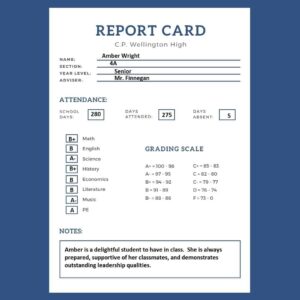
Graduation Bound…Your Degree Audit
Keeping Track of My Academic Progress
Update: March 2021
What is a degree audit?
Remember the good old days in high school, when every term you would get a report card?

Well, that report card has now transformed into a degree audit, a collegiate souped-up version of your typical high school report card.
However, it’s even better than the typical report card!
A degree audit provides you with a
- semester by semester analysis of completion of degree requirements
- your academic progress towards achieving a particular degree, major, minor, or concentration.
And you have direct online access to it.
It’s your own individualized academic pathway to college academic success.
For one thing, each semester academic advisers use the degree audit to help college students register for the right courses and track their academic progress towards completing their undergraduate degree.
This invaluable online academic advising tool is readily accessible for student use once you officially enroll.
Have you made your acquaintance yet?
Perhaps one of the greatest challenges faced by most college students is interpreting and satisfying their institution’s graduation requirements.
Theoretically, you and your degree audit should become “bosom buddies” by the end of your first semester.
Thinking about changing your major course schedule? Or taking a course Pass/Fail, and/or withdrawing from a course?
Then you need to discuss with your academic adviser the consequences of making those kinds of decisions before you do so!
Who else uses the Degree Audit:
- Faculty has access and use it to monitor how you’re doing in class.
- Academic Advisers use it to guide your course selection for each semester.
- The Registrar uses it to certify you for graduation.
How does a degree audit specifically function for you?
It basically tells you:
- Which courses you’ve taken
- Which courses you need to take
- Your degree (B.A. or B.S.) graduation requirements
- Your overall degree progress including your major, minor, electives, and transfer courses.
- Academic red flags
A Heads Up – The style and content of degree audits vary from campus to campus.

Several Typical Key Standard Degree Audit Features:
- “What if…”: allows you to see how the courses you’ve already taken apply to different majors and minors.
- “Look Ahead…”: allows you to see how courses you would select will fulfill your degree requirements.
- “Educational Planner…”: helps you and your academic advisor create a semester by semester roadmap to achieve your college and career objectives.
- “G.P.A. (grade point average) Calculator”: allows you to set personal academic goals.
- “Graduation Calculator”: allows you to speculate on the grades you will need to achieve certain academic goals.
- “Term Calculator”: anticipate the g.p.a. you can expect to earn for the semester.
- “Advice Calculator”: offers advice on how to raise your g.p.a.
In order to maximize the benefits that your degree audit offers, undergraduates need to collaborate regularly with their academic advisors.
If you’re having “personal chemistry” challenges with your academic adviser, then make that change. You can, you know.
Don’t be concerned about “hurting” someone’s feelings. Most advisers have huge caseloads and one less student will not upset their apple cart, so to speak.
They’re professionals and totally understand the importance of personal chemistry!
In summary, avoiding your academic adviser may on limit your choices, options, and, in many cases, potential opportunities.
#college #newstudentorientation #collegestudent #graduation
A Word to the Wise...
An Academic Pearl of Wisdom
Whenever a college student faces an academic and/or social challenge, they often ask a peer or a friend first for advice.
And that’s okay.
However, resolving the issue to your best advantage often requires consulting with an academic advising professional as well.
Your academic adviser knows the campus academically, administratively, and socially.
And what they don’t know, they can point you to the person who does know. Include this strategy in your current plan for college success.
And we're always available to help as well!
Disclaimer Reminder: A college student's first line of inquiry should always be with their campus academic adviser. College Success Life Advising Sessions provide additional problem-solving options to undergraduate and graduate students for further exploration on their individual campuses. Students should always consult their assigned adviser not only during the course selection process but periodically to keep apprised of programmatic changes, testing requirements, course additions/deletions, GPA modifications, etc.
Disclosure: This page contains affiliate links, which means we will make a commission at no extra cost to you, if you make a purchase after clicking my link.












